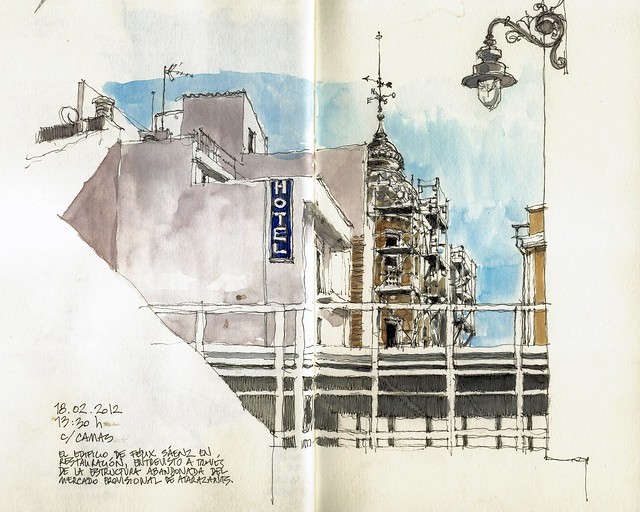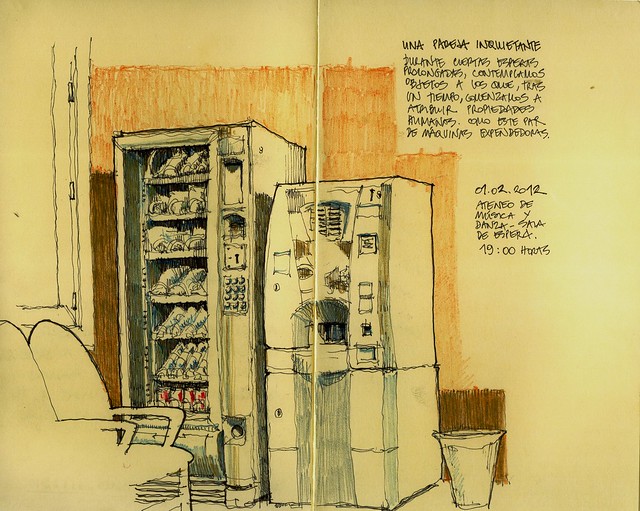
El viejo edificio parece arrugar la nariz en desaprobación ante los toscos modales de sus jóvenes vecinos.
Su decadente altivez de aristócrata contrasta vivamente con la ramplonería imperante en el vecindario.
"¡Urbanidad!", parece reclamar con voz autoritaria desde el escamoso cupulín que remata la esquina. Una palabra en desuso que tiene resonancias oscuras en nuestros días. De cualquier forma, nadie parece escucharle, pendientes como están todos de sus apremiantes asuntos mundanos.
Y, sin embargo, como buen anciano que es, tiene muchas lecciones que enseñarnos si sabemos escucharle.
El exquisito refinamiento con el que parece doblar la esquina, por ejemplo; nada que ver con la manera en la que el colindante proclama su función hotelera, a voz en grito.
O la cortesía con la que nos orienta, señalándonos el norte, en caso de que nos hayamos extraviado. En un alarde de amabilidad incluso nos indica la dirección del viento; sus vecinos, en cambio, hacen un aparatoso alarde de tecnología. Del mismo modo que alguien que en una reunión desenvainase el móvil y comenzase a hablar en un tono de voz desconsideradamente alto, éstos exhiben sus antenas de TV o sus unidades de aire acondicionado de una manera totalmente descarada y ostentosa, ajenos a cualquier desaprobación que pudieran suscitar.
Que todo cambie para que todo siga igual, era el lema del príncipe de Salina en Il Gattopardo, su estrategia para adaptarse y sobrevivir en un mundo cambiante. Temo que nuestro aristócrata sea ya demasiado viejo para adaptarse a su cambiante entorno. Y que éste sea demasiado insensible como para asimilar las sabias enseñanzas del venerable maestro.
A fin de cuentas, si miramos desprejuiciadamente el significado de urbanidad en el diccionario, vemos que significa: Cortesanía, comedimiento, atención y buen modo. Nada más y nada menos.
The old building seems to wrinkle his nose in disapproval of the rude manners of his young neighbors.
His haughty decadent aristocrat contrasts sharply to the prevailing vulgarity in the neighborhood.
"Civility", he seems to claim in an authoritative voice from the squamous cupola that crowns the corner. A disused word today. However, nobody seems to listen, busy as they all are with their pressing worldly matters.
And yet, as good old it is, has many lessons to teach us if we listen.
The exquisite refinement in which he turns the corner, for example, nothing to do with the way in which the adjacent hotel proclaims its function, loudly.
Or the courtesy with which we are guided by him, pointing north, in the event that we have lost. In a display of kindness he even indicates the direction of the wind; their neighbors, however, make an ostentatious display of technology. Just as someone in a meeting taking his cell phone out and speaking in a loud voice thoughtlessly, they exhibit their TV antennas or air conditioning units in a completely blatant and ostentatious manner, unrelated to any disapproval that might raise.
If we want things to stay as they are, things will have to change, was the motto of the Prince of Salina in Il Gattopardo, its strategy to adapt and survive in a changing world. I fear that our nobleman is too old to adapt to its changing environment. And its neighborhood is too insensitive to assimilate the wisdom teachings of the venerable teacher.
After all, if we look at prejudice, the meaning of civility in the dictionary, we see that means: courtesy, politeness, attention and good way.


